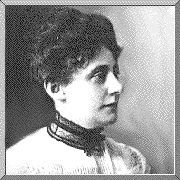 Ida
Hyde was
born in Ohio in 1857. She obtained a B.S. degree from Cornell
University in 1891. Later she studied embryology at Bryn Mawr college
and received her Ph.D. degree in physiology from the University of
Heidelberg, Germany. Hyde's research was conducted at the University
of Heidelberg, University of Bern, Harvard University, the Marine
Biological Laboratory at Woods Hole, and the University of Kansas.
her research included investigations of the breathing mechanism of
the horseshoe crab and the grasshopper. She also investigated the
respiratory center of the skate, amphibians, and mammals.
Ida
Hyde was
born in Ohio in 1857. She obtained a B.S. degree from Cornell
University in 1891. Later she studied embryology at Bryn Mawr college
and received her Ph.D. degree in physiology from the University of
Heidelberg, Germany. Hyde's research was conducted at the University
of Heidelberg, University of Bern, Harvard University, the Marine
Biological Laboratory at Woods Hole, and the University of Kansas.
her research included investigations of the breathing mechanism of
the horseshoe crab and the grasshopper. She also investigated the
respiratory center of the skate, amphibians, and mammals.
She is credited with the invention of the micro electrode, which was used to deliver discrete electrical or chemical stimuli to a cell and to record the electrical activity from an individual cell. Later in her career, Hyde used her micro electrode to investigate the properties of contractile cells.
Ida H. Hyde was the first woman to be elected to the American Physiological Society. She endowed scholarships for women at the University of Kansas and at Cornell University. She also established the Ida H. Hyde Woman's International Fellowship of the American Association of University Women. Ida Hyde died in 1945 at the age of 91.
References
Kass-Simon, G., & Farnes, P. (1990). Women of Science: Righting the Record. Bloomington, IN: Indiana University Press.